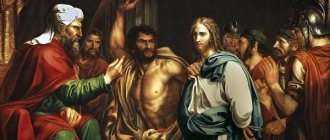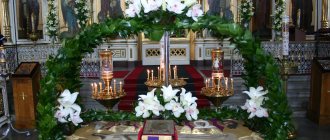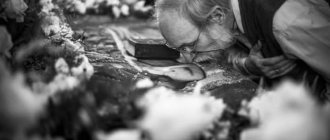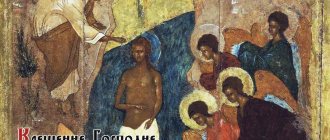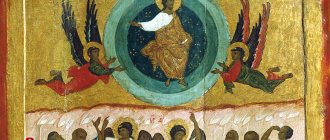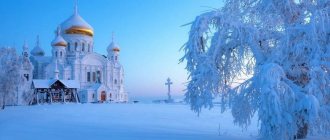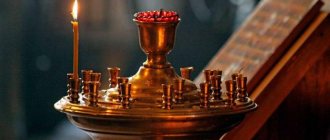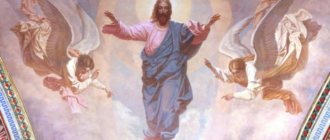Epiphany evening or Epiphany Eve is a day of the Slavic folk calendar, celebrated on January 18. Christmas time is coming to an end. The last day of caroling, the last Christmas fortune-telling. At Epiphany, snow is collected, which is believed to have special healing properties and keeps the water in the wells fresh throughout the year.
Epiphany Christmas Eve: what is it, the history of the holiday
In the Russian Orthodox Church this day is called the Eve of the Epiphany, or Epiphany Christmas Eve.
Until the 5th century, it was customary to remember the birth and baptism of the Son of God on one day - January 6, and this holiday was called Theophany - Epiphany, which spoke of the incarnation of Christ into the world and the appearance of the Trinity in the waters of the Jordan. The celebration of the Nativity of Christ was moved to December 25 (according to the Julian calendar, or old style) later, in the 5th century. This was the beginning of a new church phenomenon - Christmastide, ending with Vespers, or Christmas Eve, the feast of Epiphany.
Forefeast of Epiphany
(from 2/15 to 5/18 January)
Almost immediately after the celebration of the Feast of the Nativity of Christ, starting on January 2/15, the Church prepares us for the equally solemn feast of Epiphany with troparions and stichera specially dedicated to it (at Vespers), canons of the forefeast (at Matins) and three hymns (at Compline). And church singing in honor of the Epiphany begins already on January 1/14: on the Feast of the Circumcision of the Lord, the irmos of the canons of the Epiphany are sung in the form of a catavasia.
With its sacred memories, following from Bethlehem to the Jordan and awaiting the event of Baptism, the Church in the pre-festive stichera calls on believers: “From Bethlehem to the Jordan we will pass, for there the Light is already beginning to illuminate those in darkness.” “Come, let us see, come to the faithful place where Christ was baptized, with clean lips and washed-out souls, secretly leaving Bethlehem.” “Go forth the powers of the angels, from Bethlehem to the streams of the Jordan; and come, John, leave the wilderness”; “Get ready, River Jordan, get ready, O Zebulun, and show off, O Naphtali, let the whole earth rejoice.”
The connection between Christmas and Epiphany can be traced in many liturgical texts, in which the two holidays are compared with each other: a parallel is drawn between the events that accompanied the birth of the Savior into the world and the events associated with His Baptism from John: “The holiday that passed by is bright, the brightest, the Savior , coming: he has an Angel as the Bringer of Good News, and you will find this Forerunner as a forerunner. He is poured out with blood, as if he were childless, weeping in Bethlehem: and this, blessed waters, the font of many children is known.” "Savior! The past holiday was bright, but the coming one is even brighter. That one was foreshadowed by the Angel, and this one was prepared by the Forerunner. Then blood was shed, and Bethlehem, having lost its children, wept, but now the waters are blessed and the font becomes abundant.”
“The holiday that has passed is clear, but the most glorious is the present day: on this day you bowed to the Savior, and on this day the servant is glorified to baptize the Lord. There is the shepherd, whistling, seeing and marveling, and here is the voice of the Father preaching the Only Begotten Son.”
Candlemas. Epiphany. Two-part icon. Workshop of the Bogatyrevs. 1814-1822 Nevyansk.
Jesus Christ came to the Jordan River, where St. John the Baptist preached repentance, having reached the age of thirty in human nature (Luke 3:23): “In the preceding feast we saw the Infant You; in the present we see You perfect (mature, adult),” says Saint Sophronius, Patriarch of Jerusalem.
The liturgical texts emphasize that if, thanks to the Nativity of Christ, the whole earth was sanctified, then in the Baptism of the Lord the nature of water was sanctified: “The earth was sanctified by Thy holy Nativity, by the Word, which told the heavens by the star of Thy glory. Now the watery nature is blessed, I give birth to You in the flesh, and the earthly race returns to its first nobility.” “The earth was sanctified by Thy holy Nativity, O Word, when the heavens through the star proclaimed Thy glory. Now, when You have been baptized in the flesh, the nature of the water is blessed and the human race returns to its original nobility.”
Epiphany Christmas Eve: Orthodox traditions and customs
On the eve of Epiphany, a strict fast was observed. Therefore, the festive dinner on Epiphany Eve was nicknamed “hungry kutya”. Kutya, oatmeal jelly and pancakes were always present on the festive table. At Epiphany, pancakes were carried to the barn for the brownie to ensure the well-being of the livestock. The peasants ate pancakes so that there would be a good grain harvest in the coming year.
There is no special riotous fun on Epiphany Eve. If a person has the opportunity to be in church at this time, then it would be good to be there. Moreover, all the services of this cycle - Christmas - Christmas Eve - Epiphany - are special and very beautiful. This, by the way, is recognized by people who go to church for the first time on Christmas Eve.
Epiphany Christmas Eve is a day of strict fasting and repentance. Fasting prepared believers for the feast of the Epiphany, which was always distinguished by pomp and solemnity. The blessing of water occupies a central place in it. Two rites of consecration of water are performed: one on the eve of the holiday - inside the temple, the other - on the day of Epiphany - at the nearest reservoir.
It is believed that Epiphany water gives health, sanctification, blessing and purification. On Epiphany at midnight we went to the river to fetch water. There is a belief that at this time the water in the rivers sways. Water was poured into the bowl in the evening, and at midnight it was supposed to sway on its own. If this happened, then this is a good sign - it means that the person saw the appearance of the Lord.
On Epiphany evening they collected snow. It is believed that it heals diseases. It was used for washing, so the water from it was stored for a long time. It was also believed that only with its help can the entire canvas be whitened as needed. Snow was also collected for a bathhouse: “A snow bathhouse will add beauty.” They believed that if the snow collected that evening was thrown into a well, the water in it would not deteriorate or dry out throughout the year.
Royal watch
Instead of the usual Hours on the eve of Epiphany, January 5 (18), special Hours are celebrated, called “royal” Hours, since the kings prayed for them. On them, psalms selected for the theme of the holiday are read, as well as corresponding passages from the Old and New Testaments, and special troparia to the Epiphany are sung. The hours of the 1st, 3rd, 6th and 9th and the following hours are Fine, combined into one service, performed in the first half of the day.
At the 1st hour, in the special 31st and 26th psalms, the Church portrays the Lord who received Baptism as a Shepherd, who, according to the prophecy of the king and prophet David, “shepherds me and deprives me of nothing,” who is “my enlightenment and my Savior.”
The troparia tell how the prophet Elisha divided the Jordan with a militia (a coarse woolen cloak made from sheep's wool) of the prophet Elijah. This prefigured the true Baptism of Christ on the Jordan, by which the watery nature was sanctified and during which the Jordan stopped its natural flow.
Troparion of the Forefeast , tone 4: The Jordan River, which sometimes returns and flows with the mercy of Elisse, will lift up Elijah, and divide the waters here and there, and the path will be dry for him, even if it is wet, in the image of true Baptism , while we are going through the procession of our current life: Christ appeared in the Jordan sanctify the waters.
The last troparion depicts the feeling of reverent fear that seized John the Baptist when the Lord Jesus Christ came to him to be baptized: “To the voice of him crying in the wilderness, prepare the way of the Lord, you have come, Lord, receiving the form of a slave, asking for baptism, not knowing sin. I saw the water and was afraid. The Forerunner was trembling and cried out, saying: How will the lamp of Light illuminate? What hand will a slave lay on the Master? Sanctify the waters for me, O Savior, take away the sin of the world.”
In the proverb of the 1st hour, in the words of the prophet Isaiah, the Church proclaims the spiritual renewal of believers in Jesus Christ (Isaiah, chapter 25). By reading the Apostle and the Gospel, the Church proclaims the Baptist and Forerunner of the Lord, who testified to His eternal and Divine greatness (Acts 13:25-32; Matt. 3:1-11).
At the 3rd hour , in Psalms 28 and 41, the prophet depicts the power and might of the baptized Lord over water and all other elements of the world: “The voice of the Lord is on the waters: the God of glory will roar, the Lord on many waters. The voice of the Lord in the fortress; the voice of the Lord in splendor."
The proverb contains the words of the prophet Isaiah, who foresaw spiritual rebirth through Baptism and called for it: “Wash yourselves and be clean” (Is. 1:16-20); the Apostle speaks of the difference between the Baptism of John and the Baptism in the Name of the Lord Jesus Christ ( Acts 19:1-8), in the Gospel - about the Forerunner who prepared the way for the Lord (Mark 1:1-3).
At the 6th hour , in Psalms 73 and 76, David prophetically depicts the Divine greatness and omnipotence of the One who came to be baptized in the form of a servant: “Who is the great God as our God? You are God, work miracles. You saw the waters, O God, and you were afraid: the abyss was crushed.”
The troparia contain the Lord's answer to the Baptist on the Jordan and indicate the fulfillment of the psalm prophecy, when the river stops its waters when the Lord descends into it to receive Baptism. “Thus says the Lord to John: prophecy, come baptize Me, who created you, and enlightens with grace, and cleanses everyone: touch My Divine top, and do not doubt. Leave everything else now, for I have come to fulfill all righteousness. You will not doubt at all, for I strive to destroy the warrior, the prince of darkness, lurking in the waters, delivering the world from his snares now, giving, as the Lover of Mankind, eternal life.”
In the proverb, the prophet Isaiah proclaims salvation in the waters of Baptism and calls on believers: “Draw water with joy from the fountain of salvation” (Is. 12); The Apostolic Reading commands those baptized into Christ Jesus to walk in newness of life (Rom. 6:3-12); The Gospel reading preaches the Epiphany of the Holy Trinity at the Baptism of the Savior, His forty-day labor in the desert and the beginning of the preaching of the Gospel (Mark 1:9-15).
At the 9th hour , in Psalms 92 and 113, the prophet announces the royal greatness and omnipotence of the baptized Lord. “Wonderful are the heights of the sea, marvelous in the high places is the Lord! See the sea and run, Jordan return back. What are you, sea (what is the matter with you, sea), as if you ran away? And to you (and with you), Jordan, how did you return back?”
The troparia depict Christ appearing to the world as the Savior of the world, delivering it from sins and corruption, sanctifying humanity with the water of Divine Baptism and giving adoption to God instead of the previous slavery to sin. In the last troparion, concluding the pre-festive singing, the Church turns to the Forerunner and Baptist of the Lord and asks him to offer prayers to the One who was baptized by him.
In the proverb, the prophet Isaiah depicts the inexpressible mercy of God towards people and the gracious help for them that appeared in Baptism (Is. 49: 8-15). The Apostle announces the manifestation of the grace of God, saving for all people, and the abundant outpouring of the Holy Spirit on believers (Titus 2:11-14, 3:4-7). The Gospel tells about the Baptism of the Savior and the Epiphany (Matthew 3:13-17).
What to serve on the table on Epiphany Christmas Eve
The festive dinner on Epiphany Christmas Eve was called “hungry kutya”. The obligatory dishes of this meal were kutia, pancakes, and oatmeal jelly. On Epiphany night, young people spent their last Christmas party with songs, fortune-telling and other entertainment.
In the evening it was customary to eat juice . Until the beginning of the 20th century in Rus', this dish (like kutya) was prepared mainly from rye grains, and later from rice and wheat grains. That is why many city residents are more familiar with kutya and sochivo, made from rice.
To make it juicy, there are several surefire ways. First, the wheat grains are soaked, and then they are placed in a cast iron pot and filled with a large amount of water. The cast iron is put into the oven for 2.5-3 hours of simmering. After which the grains turn out soft and tasty. It is also very important to quickly pour hot, well-fed (a solution of honey and water) over the grains. Then the juice turns out really juicy.
Guests are never invited to Sochivo. You can treat your family and friends with porridge by bringing it home to them. Each family member needs to eat at least a spoonful of this dish before the main meal.
Sochivo is prepared not only from rice, but also from rye and wheat grains. It is believed that each ingredient of the dish has its own sacred meaning. For example, wheat symbolizes fertility and new life. Honey represents the sweetness of life and various benefits. Nuts are a symbol of prosperity and abundance. And raisins are the unity of male and female energies. Poppy symbolizes wealth, and dried fruits symbolize beauty.
How was the Sacrifice of Christ different from the Old Testament?
The Old Testament sacrifices, which still could not completely clear the conscience of people, were a kind of symbol, a prototype of the true future sacrifice that Christ performed. Those sacrifices and they constantly had to make the same sacrifices over and over again. “The law, having a shadow of future benefits, and not the very image of things, by the same sacrifices continually offered every year, can never perfect those who come with them” (Heb. 10:1). “And he, having offered one sacrifice for sins, is seated at the right hand of God forever” (Heb. 10:12).
What not to do on Epiphany Eve January 18
The consumption of many foods before Epiphany is prohibited. The fast lasts from the evening of January 17th. In this regard, you should not eat meat and fish dishes. In addition, alcohol and dairy products should be excluded from the diet.
On Epiphany Christmas Eve you cannot overeat and have noisy parties. It is advisable to stop watching entertainment programs on TV.
Even on January 18, you can’t do laundry or sweep trash out of corners.
On this day you should not quarrel with family and friends, or use foul language.
Prohibitions
It is forbidden:
- swear and use foul language;
- just get angry;
- place an even number of dishes on the table;
- think about bad things or simply think badly about someone while you are collecting consecrated water or water that you are just about to consecrate;
- eat meat and drink alcohol, even use vegetable oil when cooking - strict fasting on January 18;
- overeating during a holiday dinner.
Photos from open sources/Internet
Epiphany Christmas Eve - Slavic customs on Epiphany evening
For the last time, the mummers are walking around the village, carrying burning brands, and knocking on every window with a bear's paw. On this day, Kolyada “rides off on white horses.” In Polesie, trees, horses, people and carts are painted on window frames and doors. In some places they “write out Kolyada”: they draw three crosses with chalk on the windows and doors, crossing themselves, having with them a loaf of bread, a candle, a plate, a spoon of kutya, and holding a hat at hand. After this, they sit down to dinner (“vecherati”).
The ritual meal on Epiphany Eve took place according to the customs of “kolyadnye” (festive Christmas Eve) dinners. An odd number of Lenten dishes were prepared.
The Eastern Slavs necessarily cooked kutya, dishes made from peas or beans, uzvar from dried fruits, and baked pancakes and bread products. At dinner, some Christmas customs were repeated: they invited “frost” (“the wolf”, “birds”, “animals” and other characters) to dinner; they threw the first spoon of kutya to the ceiling; they lit a candle “for the dead”; They set aside a portion from each dish for the souls of their ancestors.
On Epiphany Christmas Eve, the Bulgarians had their last Christmas dinner (Bulgarian: kadena supper): walnuts and grain were added to the Lenten dishes; they lit a candle that had not burned out after the previous two Yuletide meals.
The Croats of Samobor only on the eve of Epiphany began to eat the ritual bread letnica (Croatian letnica), which was laid out on the festive table every time on the eve of Christmas, New Year, and Epiphany.
The Slovenes baked three loaves of bread at Christmas time, the largest of which (Slovenian: poprinjak, mocen kruh) was eaten on the Day of the Three Kings in order to be strong and healthy.
In the Rhodope Mountains they baked bread similar to Christmas bread with a baked coin used for fortune telling. After dinner, they fed poultry in a barrel hoop, told fortunes, tied straw around fruit trees, and performed other rituals similar to the magical practice of the Christmas-New Year cycle.
What were the Old Testament sacrifices?
The book of Leviticus, starting from chapter 1, describes in detail the order of sacrifices established by God, without which the sacrifice had no power. First of all, a priest was needed for the sacrifice, for according to the law only priests who came from the line of Aaron had the authority to perform sacrifices.
In addition, an innocent animal had to be sacrificed, onto which the sins of the person making the sacrifice were transferred. This happened through the priest laying his hands on the head of the sacrificial animal and then sacrificing it. “For without the shedding of blood there is no forgiveness.” (Heb.9:22)
Once a year, according to the Law, the High Priest sacrificed two goats for the sins of the entire people. The high priest took two goats (Leviticus 16), sacrificed one as a burnt offering for sin, and the other, having first laid hands on him and thus confessed all the sins of the people, released him into a deserted place where he died. In this way, the priest cleansed the entire people from all sins once a year.
How was the Sacrifice of Christ different from the Old Testament?
Epiphany Christmas Eve: signs and beliefs
“Epiphany Evening” was considered a time of rampant evil spirits. During this period, it is possible to communicate with another world and evil, which strives to enter the home as a werewolf in any guise: dogs, cats, snakes, pigs. But often werewolves enter a house in the guise of a baby, a wanderer, a miller, a blacksmith, or they can take the form of an acquaintance - a relative or neighbor.
Ideas about werewolves go back to ancient times. They are associated with the belief that shamans or sorcerers have the ability to take the form of an animal, a person, a plant, and even a stone. The belief in the existence of werewolves developed under the influence of the idea of the animation of all nature (animism), the origin of people from various animals (totemism), and the cult of fertility.
The Slavs divided the year into two halves - winter and summer. The off-season periods - autumn and spring - were considered “the times between times.” At this time, nature is on the verge of life and death. Our ancestors believed that during periods of “between times,” which also include midnight and noon, spirits and souls are especially active. According to the belief of the ancients, during these periods of time people, having changed their appearance, can visit another world and come into contact with evil spirits, to their detriment or benefit. A person only had to put on the skin of some animal or decorate himself with other attributes of nature, and he, while remaining human, at the same time turned into another creature or object, being at the same time “neither one nor the other.”
Over time, the idea developed in people's minds that some people are more capable of such transformations, while others are less capable. Those who are more capable are able to quickly and directly contact the forces of nature, either benefiting people or harming them. Based on these thoughts, the belief in werewolves arose.
What righteousness did Christ come to fulfill?
The traditional interpretation in Protestant (and not only) churches is this: Jesus gave us all an example that we need to accept baptism, that it is true. However, let us remember that before Him people were baptized in the Jordan for the remission of sins, which they confessed with the firm intention not to commit again, and the Son of God was sinless, and there was no need for Him to confess. Consequently, He was baptized in order to take away all the sins of the world, as John the Baptist testified: “Behold the Lamb of God, who takes away the sin of the world.” (John 1:29).
In other words, Christ came into this world according to the law of the Old Testament as the sacrificial, immaculate Lamb of God. He came to fulfill the Law. “Do not think that I came to destroy the law or the prophets: I did not come to destroy, but to fulfill” (Matthew 5:17).
How they told fortunes on Epiphany Eve
Epiphany is the last night of Christmas fortune-telling. The girls went out of the gate to cast a spell on the first person they met:
- meeting a young guy means getting married soon;
- meeting an old man is not good.
Dreams that occur on the night of Epiphany are considered prophetic. Therefore, when you wake up, be sure to remember what you dreamed.
They wondered about the harvest. According to legend, frost on Epiphany night falls on those grains that will be harvested next summer, and those whose harvest will be poor will remain dry. To do this, they put different grains in cups outside at night, and in the morning they examined them: whichever frost fell on, that one would be born.
Epiphany fortune telling for wish fulfillment
On Epiphany Christmas Eve you can tell fortunes for the fulfillment of a wish. To do this, in the evening, light a candle in front of the icons and pray, asking the higher powers for patronage and protection. Then, on a separate sheet of paper, write down one of your wishes. There should be no more than ten of them in total. Desires must be feasible and real. Before going to bed, place the leaves under your pillow.
In the morning, wash yourself three times with Epiphany water and say:
“Let your wish come true on a magical night, Let everything good you dream about never be forgotten. The evil eye and bad dream will be washed away by Epiphany water, And everything bad will leave my life forever.”
After this, take out one piece of paper from under the pillow without looking. The wish written on it will definitely come true in the near future.
Fortune telling
Since time immemorial, on the eve of Epiphany in Rus', fortune-telling has been widely practiced: for the groom, for a prophetic dream, for wealth, and so on. It is important to note that fortune telling in Orthodoxy is prohibited and is equated to witchcraft. For this reason, immediately after the ceremony, people doused themselves with holy water or dived into an ice hole to wash away their sin.
Young girls first of all wondered about marriage. To do this, the girls took apples and carved the initials of their boyfriends on them, after which they put them in a bowl and turned off the light. After thoroughly mixing the apples, the girls took a bite from each and chose the sweetest. The one whose name was carved on the most delicious apple was the future groom.
The means for fortune telling were objects in which, according to legend, magical power was concentrated. It could be a shoe, a skirt, a belt, a stocking, a thimble, a needle, a ring, a comb, a mirror. When doing fortune telling, the girl had to meet certain conditions by choosing the right place and time. But first of all, the girl had to leave the protection of her religion and amulets. Christian women, for example, took off the cross, and without exception, regardless of religion, they untied all kinds of knots on themselves, including belts, let down their hair, and sometimes took off all their clothes, including shoes.
To protect herself from otherworldly forces, the girl drew a magic circle around herself - with a candle or a torch, a knife, a poker. If they were telling fortunes in a group, the girls stood in a circle, holding each other's little fingers.
One had to go to the place of fortune-telling in silence, in the dark, trying to remain unnoticed. A special place for fortune telling was also chosen - “unclean”. This could be either an abandoned house, as well as a barn or canopy, a basement or attic, sometimes even a cemetery, or “border” places - those where two worlds form a border: a threshold or corner of a house, a gate, a crossroads, places near water (wells, cut through). They told fortunes in houses, they also told fortunes near churches.
Since ancient times, the crossroads have been considered an unclean place that belongs to demons; they said that at the crossroads an unclean spirit has power over a person. This place is the “border” between two worlds; both dangerous and, conversely, healing actions were performed here. The gate, which also served as a place for fortune telling, is a symbol of the border between one’s world and someone else’s. The girls would throw their shoes over the gate, standing at the gate, make a guess as to who would pass by (the appearance of a man foreshadowed an imminent marriage), climb onto the gate and “call out for share,” guessing their future from the sounds and voices they heard.
Fortune telling at the crossroads
At exactly midnight, come to the crossroads to “listen to the neighborhood.” Cheerful laughter or singing nearby means quick marriage and fun. If you hear crying or lamentations, there will be no wedding this year. It is believed that it is at the crossroads that you can hear the voice of fate, because here is the border between two worlds, and, standing at the crossroads, it is as if you are in two worlds at the same time.
Fortune telling on the mirror and the month
On one of the Christmas nights, when the month is visible in the sky, take a small mirror, go to the window and point the mirror so that the month is reflected in it. Look closely - after a while, instead of one month, you will see several. Count how many months you imagined: this is how the girls wondered about their future family - whether it would be big or not.
Fortune telling with three mirrors
For this fortune telling you will need three mirrors of approximately the same size and two tall candles. They begin such fortune-telling at midnight, having first outlined themselves in a magic circle - a sign of protection (drawn with chalk, a burning torch, and a candle).
Place two mirrors, one opposite the other on each side of you, light candles in front of them, and place the third behind them. You should see a reflection from the third mirror in the side mirrors, from where your betrothed should appear from the looking glass behind you.
Under no circumstances should you turn around or look at the figure in the mirror for too long. If the vision is frightening, say three times: “Forget me!” - and stop fortune telling by extinguishing the candles.
Fortune telling with matches
Insert two matches into the sides of the matchbox and light it. If the burnt heads turned towards each other, it means that the “given” guy and girl will be together.
Fortune telling by strings
Cut the threads to equal lengths and set them on fire. Whoever's thread burns out faster will be the first to be married. If less than half of the thread burns out or the thread goes out immediately, then you won’t get married this year.
Wealth or poverty
Quickly immerse the lit splinter into the water. If it goes out immediately, it means a poor life is expected, and if the fire goes higher, a rich life is expected.
Fortune telling by cat's paw
Make a wish and call the cat. If she crosses the threshold of the room with her left paw, it means her wish will come true. If right - alas! - No.
Royal dream
Place four kings from a deck of cards under your pillow and say a request-spell: “Who is my betrothed, who is my mummer, appear in my dreams!” The betrothed-mummer must definitely dream about it - in the image of a king - with a crown on his head and in a royal robe.
Signs for the weather on Epiphany Christmas Eve
- If there is a snowstorm on this day, then take revenge on it in 3 months. Another snowstorm on Golodnaya Kutya indicates that bees will swarm well.
- Dogs bark a lot on this day, which means there will be a lot of game.
- If it snows in the morning, buckwheat will produce well.
- A clean and clear sky on Epiphany night means a rich pea harvest.
- The stars shine brightly - the bread will be good.
- A full month on Epiphany Eve means high water in the spring.
- If there are no stars in the sky, then mushrooms will not grow.
In the sacrifice of Jesus Christ all the conditions of the Law were fulfilled
His sacrifice covered all the shortcomings of the Old Testament, because of which people living under the Law could never be freed from guilt. She granted them absolution from all sins, as the Apostle faithfully testifies to.
“Therefore, God, wanting more to show the heirs of the promise the immutability of His will, used an oath as a means, so that in two immutable things in which it is impossible for God to lie, we would have firm consolation, having resorted to take hold of the hope set before us, which for the soul is like a safe anchor and strong, and enters into the innermost part of the veil, where Jesus entered as a forerunner for us, having become a High Priest forever after the order of Melchizedek” (Heb. 6:17-20).

